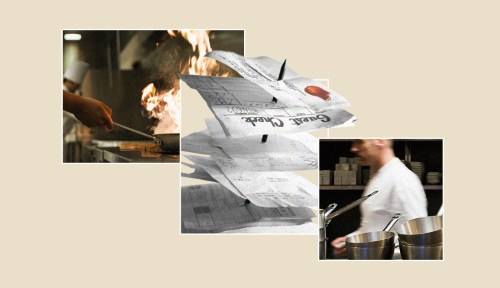In pop culture, the trope of the demanding, domineering chef is as old as that jar of anchovies sitting in the back of your pantry. Gordon Ramsey barking orders on Kitchen Nightmares; the sadistic antagonist that was Chef Skinner in Ratatouille; Bradley Cooper’s portrayal of Adam Jones, a hot-headed, substance-abusing chef in Burnt.
Experts in This Article
Dina Butterfield is the chef de cuisine at Uchi Miami.
Julie D’Amico, MA, EdM, LCMHCA is the director of mental health operations at Restaurant After Hours.
Patrick Keefe is the culinary director at Legal Sea Foods.
Raeghn Draper is the co-founder of The CHAAD Project.
Taylor Bauer is a support group facilitator at Restaurant After Hours.
But now, in the wake of the #MeToo movement, the restaurant industry is facing a real-life reckoning, as new reports of scandal and abuse continue to make headlines.
Take, for instance, the recent allegations against Dan Barber, chef and co-owner of Blue Hill at Stone Barns. A number of former staffers have come forward to shine a light on the fine-dining establishment’s brutal work culture and immoral business practices, including allegedly serving animal products to vegetarians and vegans. Or there’s the famous West Village gastropub, the Spotted Pig, which in 2017 was ousted as a hotspot for rampant sexual misconduct in their so-called “rape room,” where Mario Batali, one of the dining establishment’s key investors, frequented. Michael Chiarello, Joe Bastianich, John Besh, and Johnny Iuzzini, and Mike Isabella are just a few other famed chefs accused of sexual assault or harassment by employees. Or take Geoffrey Zakarian and Bobby Flay, who have both been sued by their own employees for failing to pay them for working overtime.
In this new age of awareness, pop cultural portrayals are shifting accordingly. They’re not playing the screaming chef for laughs or drama, they’re bringing awareness to the problem by sticking close to reality. FX’s The Bear is the prime example: It’s neither light-hearted nor unrealistic. Instead, The Bear is helping to make the abusive cycle in the restaurant industry crystal clear.
In the show, which aired this summer to much acclaim from critics and viewers alike, the antics of hot-headed ex-fine-dining chef de cuisine (CDC) Carmen “Carmy” Berzatto (played by Jeremy Allen White) after he takes over his deceased brother’s sandwich shop in the heart of Chicago were almost too close for comfort for many viewers within the industry.
“The Bear gives a very realistic look into the humble, un-glorified work of a chef,” Patrick Keefe, the culinary director at Legal Sea Foods, says. “Sure, it might be a little sensationalized, but make no mistake: Between food, the main characters, and the faculty, it shows how much a chef has to manage to stay afloat…Some scenes were so authentic that I would become anxious just watching them—I have had my Carmy moments many times in my career. But I couldn’t stop watching.”
According to Dina Butterfield, chef de cuisine at Uchi Miami, spreading real awareness about the toxic nature of the restaurant industry is imperative. “Back in the day, the mentality in the restaurant business was to leave everything at the door when you walked into the restaurant, and honestly, that was unfair and didn’t create the best culture,” she says. “After all, we spend more time in the restaurant and with each other than in our own homes.” As greater acknowledgement is helping the tides turn, it’s time the restaurant industry’s blood, sweat, and tear-type of the environment becomes a cliché of the past.
Why the restaurant industry’s abuse is a bear of a problem
“Why do you hire [expletive] idiots? Can you not handle this, is it too much for you? You have a short man’s complex. You can barely reach over this [expletive] table, right? You’re terrible at this. You’re no good at it. Go faster, [expletive]. Why are you so slow? You are talentless. You should be dead.”
In The Bear’s second episode, we watch as Carmy’s former employer, the head chef of a fine-dining restaurant, berates him. This attack was no one-time deal, and over the course of the show’s season, we see the myriad ways being subject to this repeated abuse has taken a toll on Carmy’s mental well-being. What sets The Bear apart is that it doesn’t stop at an unflinching portrayal of an abusive kitchen, and instead goes on to lay bare the mental health impact such toxic environments have on the workers within them.
According to Julie D’Amico, MA, EdM, LCMHCA, director of mental health operations at Restaurant After Hours, an organization providing mental health support for the hospitality industry, The Bear weaves in a number of themes she often encounters when working with people in the industry. “Common mental health concerns for this population are anxiety, depression, trauma, burnout, and disordered relationships with substances and food,” she says.
“Restaurant employees are expected to work in fast-paced environments, endure harassment, be obedient, and abide by power hierarchies all while performing extreme multitasking efficiently,” D’Amico says. “Yet the payoff is low: Wages are minimal, employees get very little access to health care, and are often isolated from the outside world.”
After experiencing endless shared stressful, traumatic experiences caused by the hardships of working in a restaurant, it’s not uncommon for hospitality workers to begin to grow close, socializing outside of work hours and treating each other like family. In fact, it’s often encouraged that restaurant workers think of their coworkers as family.
Take, for example, the restaurant ritual known as family meal. At most dining establishments, a “family meal” is the term used to describe a staff or group meal that a restaurant serves its employees outside of peak business hours. The restaurant provides the food free of charge—a rare perk of employment—and it’s a sacred moment where the team can sit down at the table for a few moments and dine together, in ways not dissimilar from an actual family.
While family meal can be a wonderful bonding time for staffers and a way to build and strengthen relationships, it’s indicative of how kitchens can operate more like a familial unit than a business, which can lead to close-knit relationships that often blur personal boundaries. These relationships may translate to toxic venting, but it can mean worse: think feeling extreme guilt about letting your team down if you got in the weeds during service, fighting like siblings, or drowning sorrows together at the bar next door once the shift is over.
“This industry is rampant with all forms of abuse, discrimination, and all the –isms,” says Raeghn Draper, co-founder of The CHAAD Project, a nonprofit organization working to create an accountable hospitality culture by providing equitable resources. “So when we’re drinking and partying, and we’re all feeling like a great, tight-knit community, it’s much easier to ignore all of the ways we’re being exploited or degraded every single day. We love to say that the hospitality community is so tight; we love each other. We can go anywhere in the world, and the moment people learn that you’re in the hospitality industry, you have instant community. It’s true, we love to feed each other, give each other drinks, and extend that hospitality. But we don’t love to create safe spaces for one another or hold each other accountable.”
These hot-and-cold relationships—where there are high highs of camaraderie and support and low lows of abuse—are called “trauma bonds.” Liz Powell, PsyD, a licensed psychologist, previously defined trauma bonding relationships for Well+Good as attachments created by repeated physical or emotional trauma with intermittent positive reinforcement.
“Trauma bonding can certainly happen within restaurant environments; the ‘family-style’ culture can cause employees to feel both greater sympathy and loyalty towards their abusive colleagues or managers. This further perpetuates the abuse cycle,” says D’Amico. “As with all ‘families,’ some dynamics are healthy and encourage individual growth while providing safe external support, while others rely on fear, praise, and emotional abuse to control individuals within that family.”
Unfortunately, forming trauma bonds with peers without resolving the core issues with management can exacerbate and enable abuse to continue without a resolution in sight. “In cases of domestic violence or abuse, a lot of people have difficulty leaving abusers, because they have a strong connection to them that is able to keep them there even when things are very bad,” Dr. Powell says. Studies show that when placed in these stressful situations, trauma bonding occurs by way of the body’s natural fight or flight stress response. When overcoming a traumatic experience, it can be easy to wrongfully associate the relationships formed throughout said experience with feelings of safety, bonding, or brotherhood. Aside from instances of domestic abuse in romantic relationships, trauma bonds are problematic in certain group dynamics, too, including fraternity hazing, military training, or joining a gang or cult.
What’s worse, this abuse, unprofessionalism, and misconduct has a tendency to get handed down from generation to generation within the proverbial (and hierarchical) restaurant “family” as a rite of passage. “Most of the behaviors we encounter are inherited, or ‘passed down.’ Some individuals who have endured the abuse may eventually turn into the abuser. ‘That’s what I went through’ is a common saying amongst management when questioned. Same goes for ‘I made it. I turned out fine.’ Perpetuating abuse can be a way for workers to feel like they have some power and control in their toxic environment, especially because of the power dynamics inherent in the hospitality industry,” D’Amico says.
Breaking the industry’s toxic cycle of abuse
Finding positive support in the hospitality industry has proven to be a huge challenge. “Generally, the positions that have the littlest power are at a higher risk of experiencing abuse. And this unfortunately applies to people with historically marginalized and oppressed identities in terms of gender, race, and so on,” D’Amico says. (In The Bear, while Carmy is a white man, the rest of the kitchen staff are people of color.)
“In a recent survey conducted by Restaurant After Hours, 28 percent of those surveyed—100 out of 427—said they were uncomfortable talking to senior management about their problems due to fear of retaliation,” says D’Amico. “Retaliation can come in the form of verbal abuse, having hours cut, or being fired.” Keep in mind that the vast majority of restaurants don’t have a human resources department—far from. This adds insult to injury when considering the fact that the intense, fast-paced setting molds a highly-competitive work environment that can lead staff to feel that they lack support, don’t have secure boundaries to keep them safe, or a voice to express how they really feel in the face of abuse or discrimination.
In a perfect world, finding community support and the strength to speak up would be easy. However, D’Amico explains that due to the flawed nature of the industry, it can feel nearly impossible. “A key issue here is that the responsibility is on the individual to stop abuse in an environment that may have a lot of power over them, instead of changing things at a management, organizational, and systemic level,” she says. And at the end of the day, it often comes down to employees having to choose whether or not they’re willing to risk losing their job—and the wages they need to feed themselves and their families—as a form of retaliation.
In order to break this cycle of abuse, D’Amico says management and policymakers must be held accountable. Change needs to happen from the top. “Equitable change is something that is certainly bigger than the individual—we need to poke at things at the policy and systemic level, too. The myth that mental health issues are an individual’s responsibility to respond to and find ways to cope with is so harmful. Most mental health concerns actually arise from policies, environments, and systemic factors that are on a community, organizational, and systemic level,” says D’Amico.
As awareness for issues within the restaurant industry grows outside the kitchen—thanks to shows like The Bear and others—increased pressure is put on the industry to enact change. “The more that these issues are brought up and talked about, the more we can move in the direction of real-deal community and systemic change. It all starts with small changes, and a lot of that can be done with grassroots efforts,” D’Amico says.
For instance, as part of the CHAAD Project, Draper and their team of trained professionals work with hospitality workers on a one-on-one basis to help each person understand their worth and how to speak about their valuable skills. “In the restaurant industry, part of why we’re so often exploited is because we’re told that we’re disposable, unskilled, replaceable—and that’s an absolute lie,” says Draper. “Sure, you can find a body to replace me. But in terms of my skills, my knowledge, my problem-solving abilities, and how I collaborate with my team? You can’t just replace that.”
Given that many of the serious issues in the hospitality industry need to be addressed at the systemic level, equitable change is going to be a slow process. In the meantime, however, individuals still need to find ways to protect themselves. For starters, Draper recommends avoiding employers that already have a negative reputation and keeping a close eye on red flags when interviewing for restaurant jobs.
“When applying for a role, it’s absolutely critical to pay close attention to the language used in a job description and think about why they’re choosing these words,” Draper says. A few red flags to be aware of include: A “fast-paced work environment,” “multi-tasking,” and “we’re a family.” Again, this idea of a family-style relationship can be a way of blurring the lines between employer versus working for a paycheck and guilt-tripping employees into tasks outside of their job description.
Of course, it can be nearly impossible to predict what type of work environment you’ll have until after you’ve accepted the offer. If you do end up in a toxic workplace, D’Amico underscores the fact that seeking mental health support is not a sign of weakness, but rather a sign of strength. “It is okay to not be okay. It is okay to ask for help. It is okay to focus on ourselves while we tend to others’ needs all day,” she says. Those that are in the crossfire of a harsh work environment in the hospitality industry can find help through organizations like Restaurant After Hours—and know they’re not alone.
“I think that after 2020, when this industry got to take a break for the first time ever, people got to look from the outside in and think to themselves, ‘This isn’t normal. This isn’t what other people are going through at work. This expectation is inappropriate,’ says Taylor Bauer, a support group facilitator at Restaurant After Hours. “I don’t know if without [the break], we would be having these conversations.”
In this new age of awareness, advocating for oneself is more important than ever. So until these long-overdue changes can happen at the community and systemic level, keep D’Amico’s advice in mind: Never be afraid to speak up and ask for help. (And if you don’t work in the industry, always tip 20 percent.) Yes, chef.
Sign Up for Our Daily Newsletter
Get all the latest in wellness, trends, food, fitness, beauty, and more delivered right to your inbox.
Got it, you've been added to our email list.











